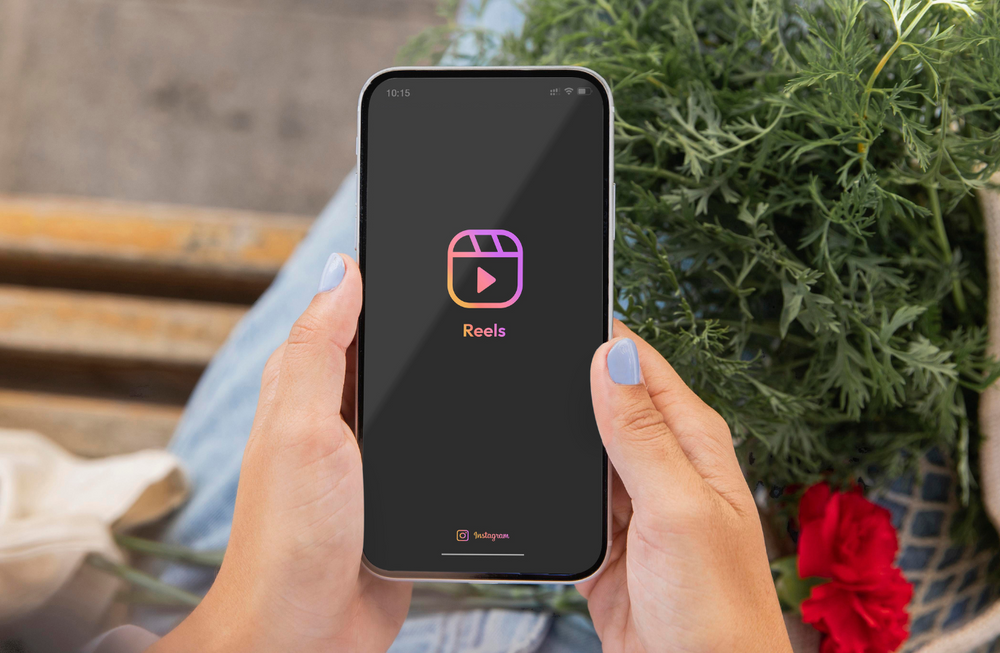For those still wondering, “how is social media educational?”, we have some news: for students and educators alike, the use of social media in education can be a total game-changer.
In fact, if there’s something the pandemic has taught us, it’s how essential the internet and social media have become to the education industry. The use of a social media website in school no longer needs to be regarded as evil.
With that in mind, let’s have a look at the role of social media in education, what benefits it brings to this industry and what are the most effective strategic ways of leveraging social media for education marketing.
Social media in education: a complete guide
What is social media in education?
Why use social media for education?
How to use social media in education: 9 actionable tips
FAQs about social media in education
What is social media in education?
Social media in education describes the use of social media websites in school, as well as other online communication tools for educational purposes.
This includes leveraging platforms like Facebook, Instagram, TikTok, YouTube, LinkedIn to facilitate learning through social media, collaboration and engagement among students, educators, and other members in the education community.
Why use social media for education?
It’s no secret that bringing social media and education together is risky business. Social media is often seen as a distraction for students, which can lead to a loss of productivity, followed by a decline in academic performance.
But that’s a very reductive description of the role of social media in education.
Using social media for learning is a smart strategy that comes with a ton of benefits for the education industry. On the other hand, social media for educators means that they have a much better chance of speaking their students’ language and improving their teaching experience.
Social media comes with a lot of challenges, and you need to be able to overlook them and focus on the importance of social media in learning in order to make the education system better for everyone involved. Only then will you be able to unlock and enjoy the educational benefits of social media.
With that being said, here are top benefits of social media in education:
- Boosts engagement
- Promotes accessibility
- Connects students and educators
- Creates professional opportunities
Connects students and educators
Perhaps social media’s biggest merit when it comes to the education sector is that it connects students and educators in a way that was not possible before.
Students can build a much more informal and close rapport with their teachers through social media conversations, sharing opinions, ideas and resources back and forth. This type of media channel helps humanize educators in the eyes of students.
Boosts engagement
At every level, educators are searching for new ways to capture and hold their students’ attention and get them involved in what is being taught.
Well, social media might be the solution everybody has been waiting for. That’s because social media as a marketing channel is very engaging.
Don’t just take our word for it. Instead, trust our latest industry benchmarks data for the education industry.
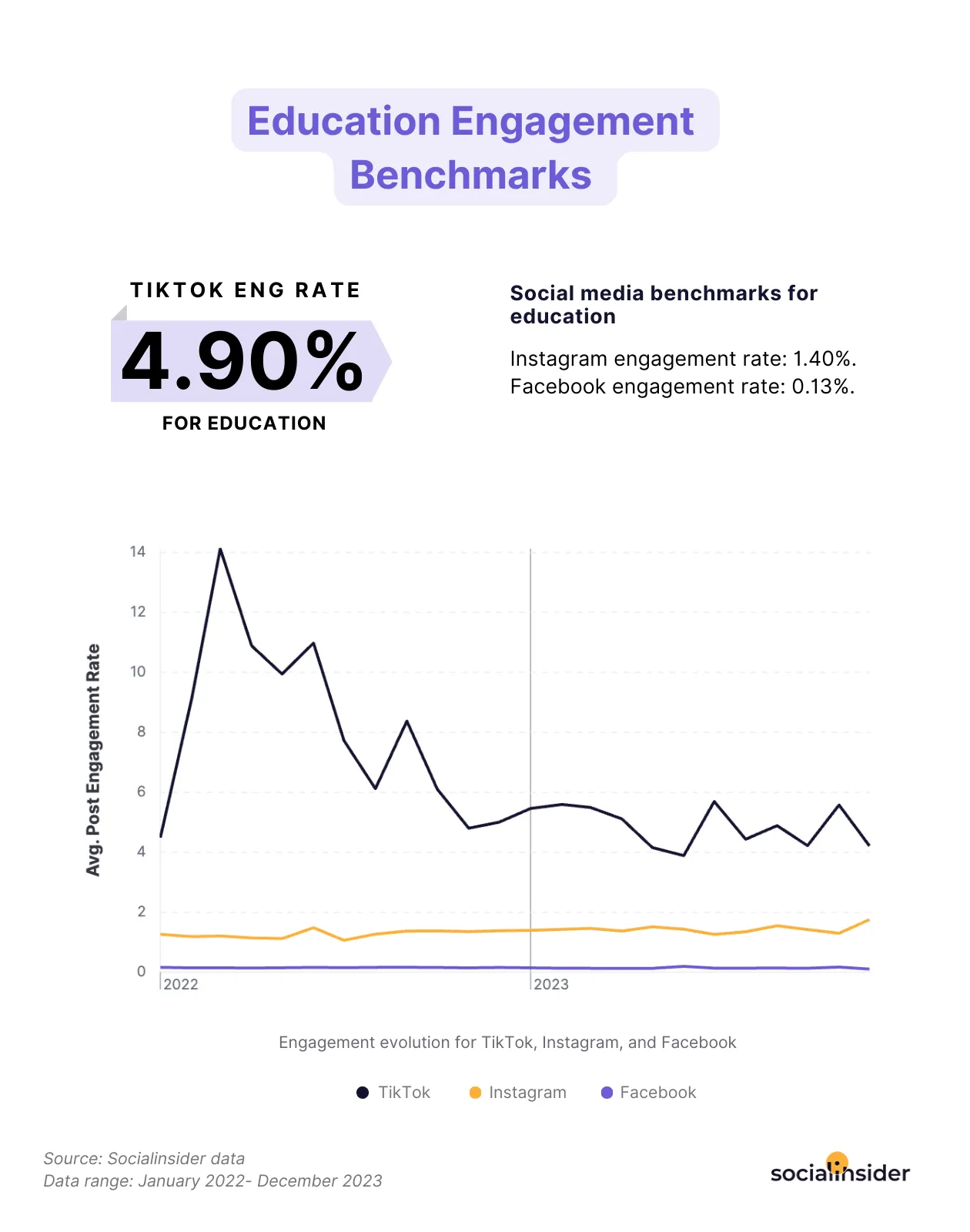
As you can see, the education industry reigns supreme when it comes to social media engagement, both on TikTok and Instagram, showing significantly greater values than the platforms’ average.
So, don’t hesitate to dive into social media for educational purposes, as it is a great way to increase engagement around school topics and activities and encourages students to make their voices heard.
Promotes accessibility
Educational institutions can reach more potential students through social media, give them better access to essential information and as a result, encourage more of them to enroll in their school.
Universities in particular strategically use social media for marketing to attract prospective students and engage current ones.
What’s more, social media can facilitate the distribution of school materials and even lectures. Everybody, regardless of their location, can access valuable resources that would otherwise be limited to a single geographical location.
Creates professional opportunities
Social media enables students to get in touch with key people in relevant industries and start building their professional network long before they graduate.
Through this channel, students can fast-track their academic and personal growth by engaging in meaningful conversations and reaching out to mentors for assistance and advice.
How to use social media in education: 9 actionable tips
If you’re on social media on behalf of an education institution and you want to start leveraging social media marketing in higher education, then the first thing you need to do is start thinking outside the box.
That being said, here are 9 popular and effective tips for using social media for education:
#1. Share news and updates instantly
When it comes to sharing important updates or announcements, bulletin boards are no longer the go-to option for schools and universities.
This highlights a major advantage of social media in education: speed.
Nothing beats social media in terms of speed. So many announcements can actually be shared on social media channels such as Twitter, on dedicated Facebook groups or on Instagram broadcast channels.
In other words, think of social media networks as your school’s new digital bulletin boards.
Students will definitely enjoy having important news delivered on their phones, and depending on the news topic, that might also help spark online conversations, therefore boosting engagement across various social media channels.
FYI, Instagram and TikTok are the most engaging platforms for the education industry, according to our latest social media benchmarks report.
Pro tip: You can track your engagement cross-channel in real time, with Socialinsider.
#2. Showcase relatable, authentic school experiences
At the end of the day, the most engaging type of education-related content shared on social media will be the relatable memes, the funny Reels or TikToks.
Keeping students engaged and actively involved is a major (if not the most important) goal so don’t hesitate to use social media as a space that depicts authentic, relatable school experiences. It wouldn’t hurt to stay on top of and participate in some social media trends, either.
Letting the students pitch in, voice their thoughts and get involved is how social media works for the education sector. That's the key to a flourishing sense of community in and around any educational institution.
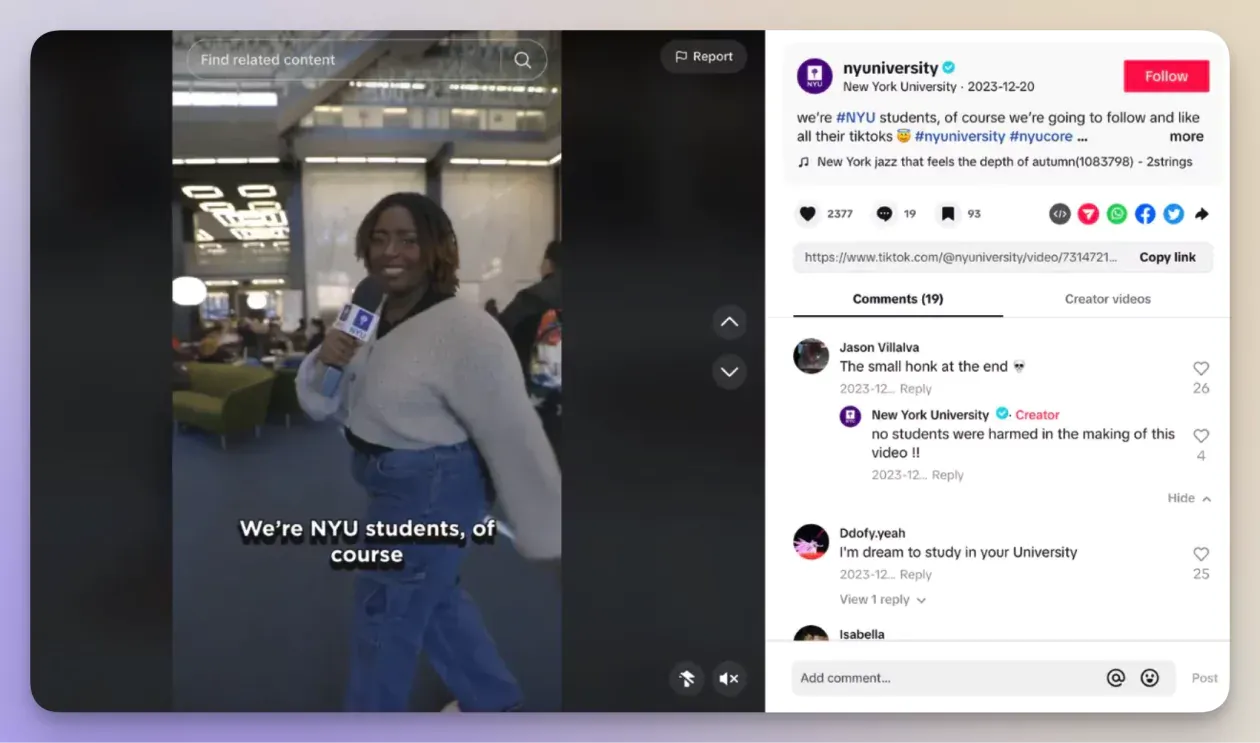
#3. Supplement existing course materials
Let’s face it: no matter how prestigious an educational institution might be, course materials can get a bit boring. But they don’t have to be, if you understand the benefits of social media for teachers.
Turns out, social media can be used to supplement course materials and make them more fun and accessible for students.
Even though some of them may get more hype than others, every channel has its strong suit. In the context of social media for education:
- Facebook brings in powerful features such as groups and live videos
- Instagram serves as the perfect visual aid due to its heavy reliance on images and videos
- YouTube is the perfect space to share long-form educational content
- TikTok can be home to short, fun videos that educate effortlessly
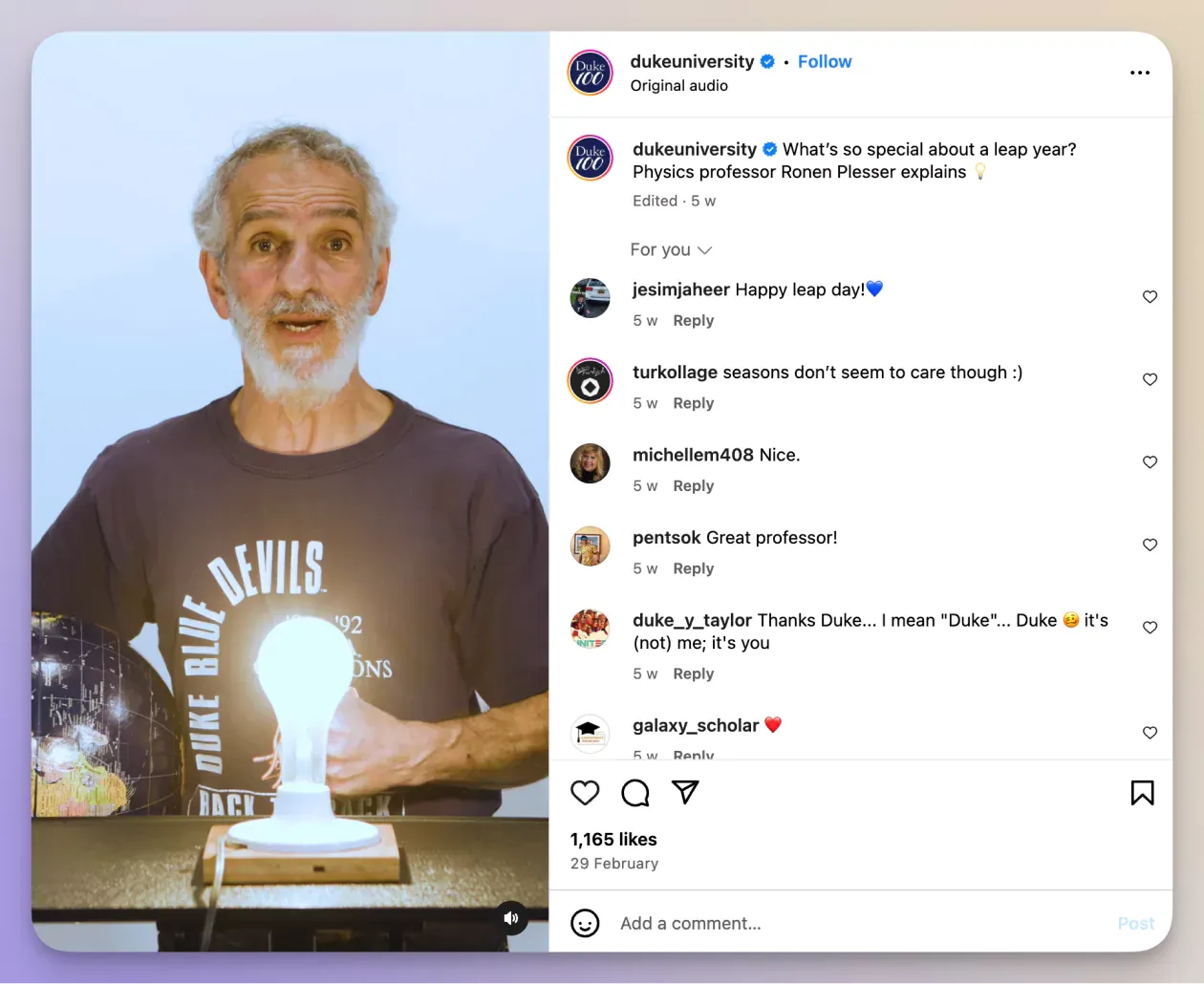
#4. Highlight social proof
It’s not just students that are highly active on social media, their parents are there too, and they rely on social proof in the process of choosing the best schools for their children.
That’s why social media can be the ideal platform for showcasing social proof, such as testimonials, success stories or feedback from students, parents, and other community members. This is one of the top benefits of social media in education.

#5. Livestream special lectures and seminars
I mentioned earlier how much the pandemic pointed to an important advantage of social media to students. It showed that many school-related activities, events and resources can also be accessed remotely.
To boost engagement, you can start by getting in touch with subject-matter experts, former alumni and influencers, and get them to host extracurricular seminars and conferences, or even interviews.
That’s educational social media at its finest.
Livestream these events and encourage participation by sharing the news on different social networks.
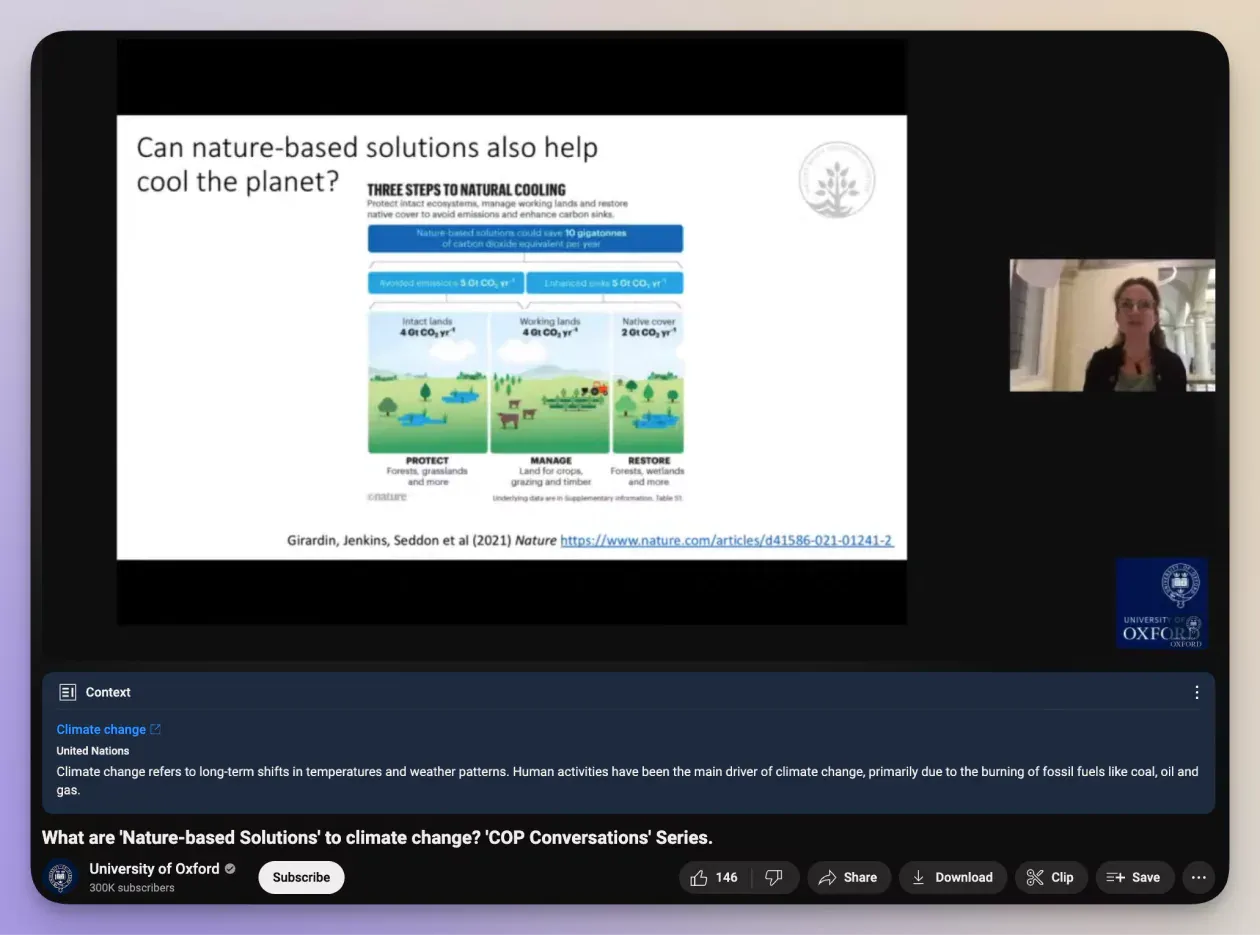
#6. Use it as a discovery tool for students
If you’re still wondering how social media helps students, it helps to see it as a tool for showcasing the culture around an educational institution.
Choosing a school or college to attend is a major, even pivotal decision in a young person’s life. So, of course, proper research is necessary to find out whether a certain institution is a good fit or not.
Through social media, students can discover much more about their future school, beyond the official statistics, directly from other students.
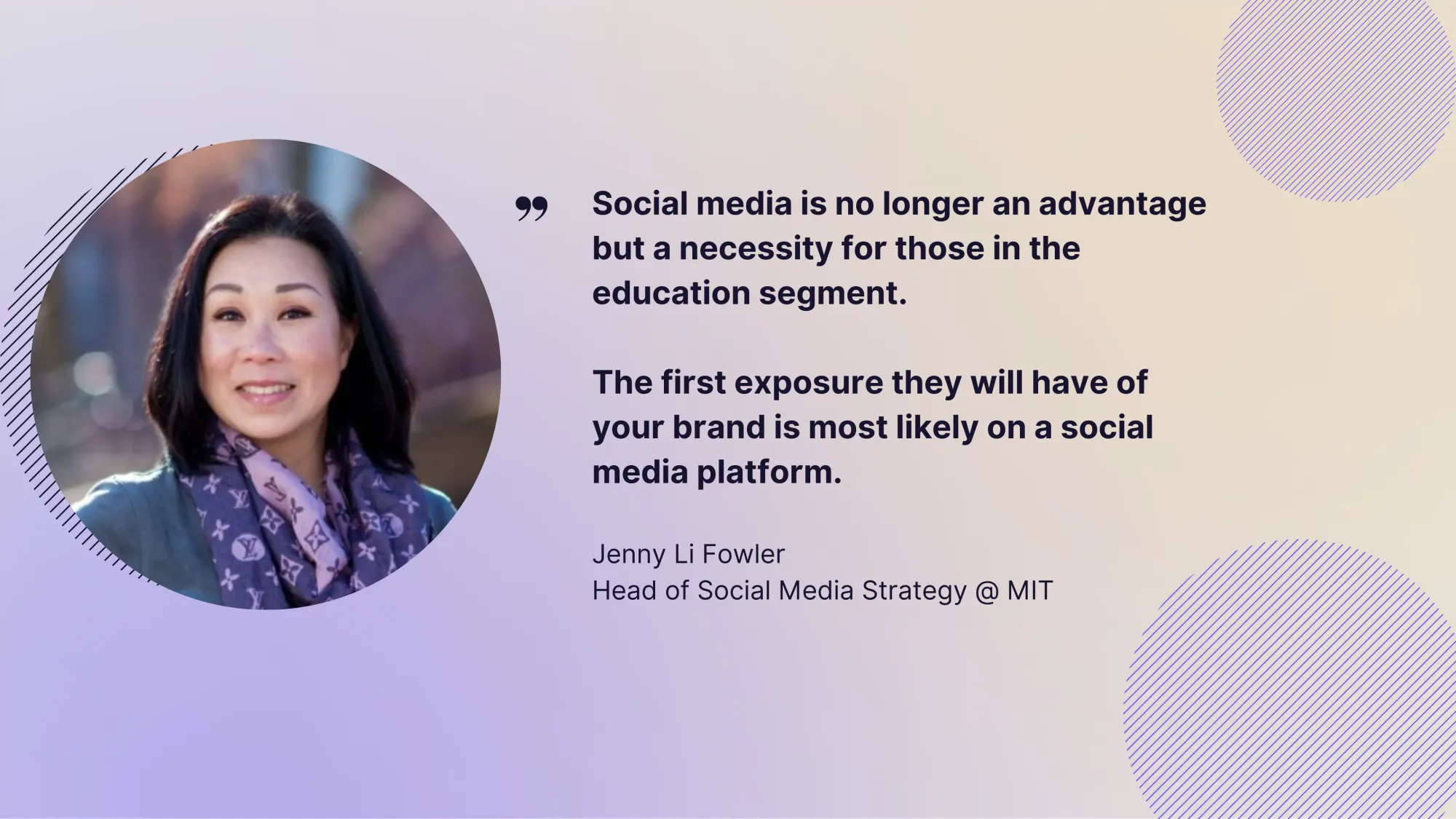
Social media posts that feature personal stories often capture the authentic student experience with everything that entails: classes, events, campus life, sports, etc.
Jenny Li Fowler, Director of Social Media Strategy at MIT, agrees with this:
Social media is no longer an advantage but a necessity for those in the education segment.
Unless someone knows a person close to them who attended your school, the first exposure they will have of your brand is most likely on a social media platform.
Gen Z and Gen Alpha use TikTok as a search engine, although what happens to TikTok remains to be seen.
But you can be sure they will not go to a school’s website for information. This is why it’s important to have an authentic presence in the spaces they are where they can find you and your stories organically.
#7. Build and promote schools’ unique identity
Social media is the perfect playground for schools that actually want to turn their identity into a brand and build brand loyalty. That’s relatively easy to do for old, prestigious schools like Harvard:

But even small, local schools and colleges can take to social media to create a brand around their institution.
Sharing success stories, student achievements and other highlights are all key factors that contribute to the credibility of an educational institution.
#8. Promote major school events or campaigns
It’s a long-standing fact that in order to market something properly, you need to meet your audience where they are.
In the case of education on social media, your audience is more likely already on all the social media platforms you can think of.
A key purpose of social media for students is to help them stay informed on what happens in and around their school. That makes social media a great tool for promoting major school events, initiatives or campaigns, in a fun, exciting way that will get as many students to participate as possible.
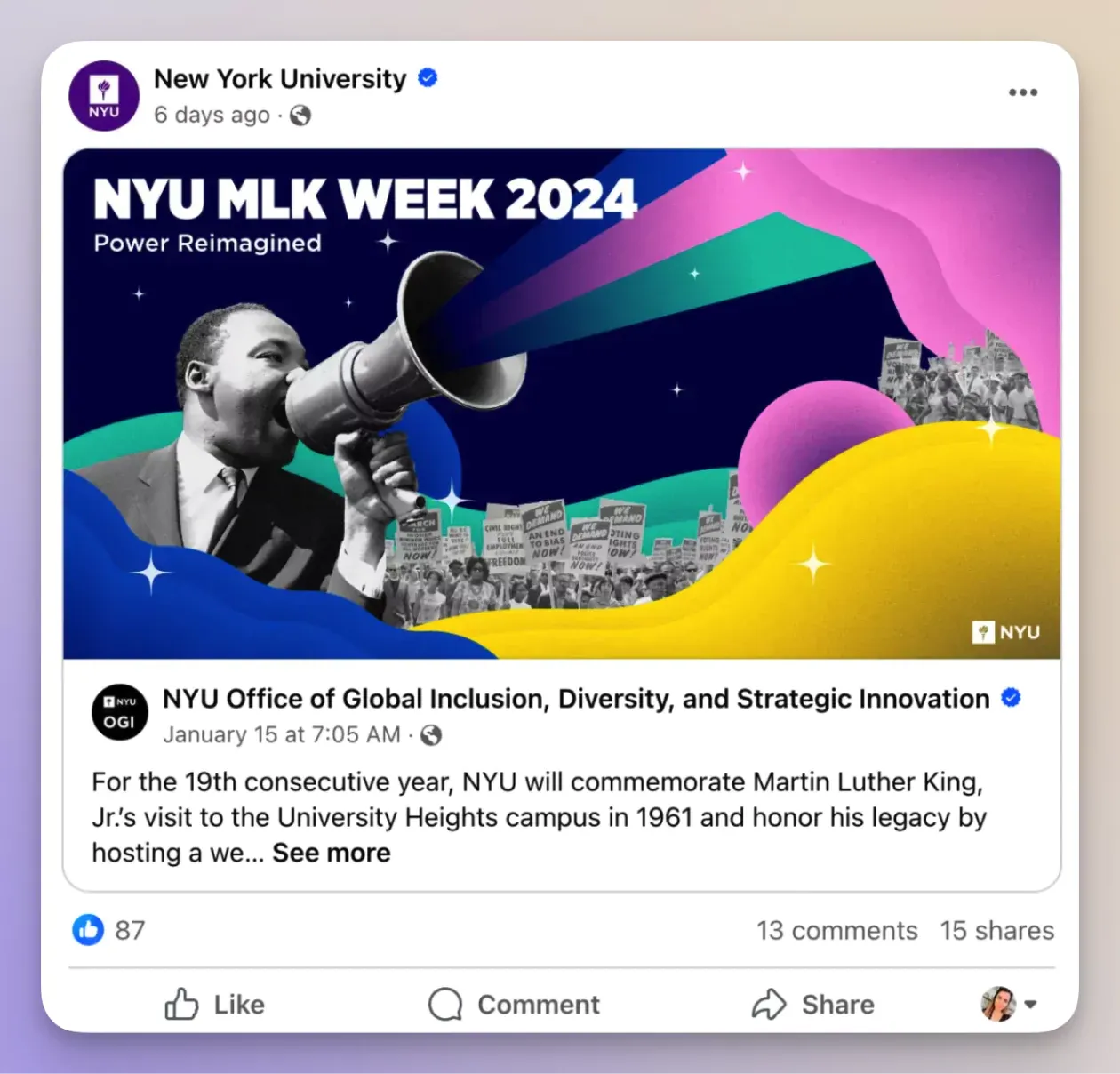
#9. Track, trust and use your performance data
When it comes to education in social media, it’s not enough to be present, you absolutely need a strategy in order to achieve your goals. We sure hope the tips we shared above will set you on the right track.
Now, you have a strategy, you’re posting on social media, you’re engaging with your audience. What’s left to do?
What’s left for you to do is measure your performance and see if your marketing efforts are paying off.
You can try your luck and see what the native apps have to offer in terms of analytics, or you can make your life easier and start with a professional social media analytics tool like Socialinsider.
Before you dive into the social media education data, it would be useful to decide which metrics matter most for you and the school or college you represent.
Usually, in the case of social media for education marketing, the focus is on:
- Reach and impressions -> to measure brand awareness
- Engagement -> to see how much your audience is invested in your content
- Follower growth -> can reflect brand awareness or even new student admissions
- Competitive benchmarks -> to see how you stack up against other schools in the same league
Luckily, you can access all these insights in Socialinsider.
For instance, a group of graduate students from Duke University MIDS (Master in Interdisciplinary Data Science) are using Socialinsider to increase their understanding and expertise on data science that they gain through coursework in computer science, statistics and other analytical sciences.
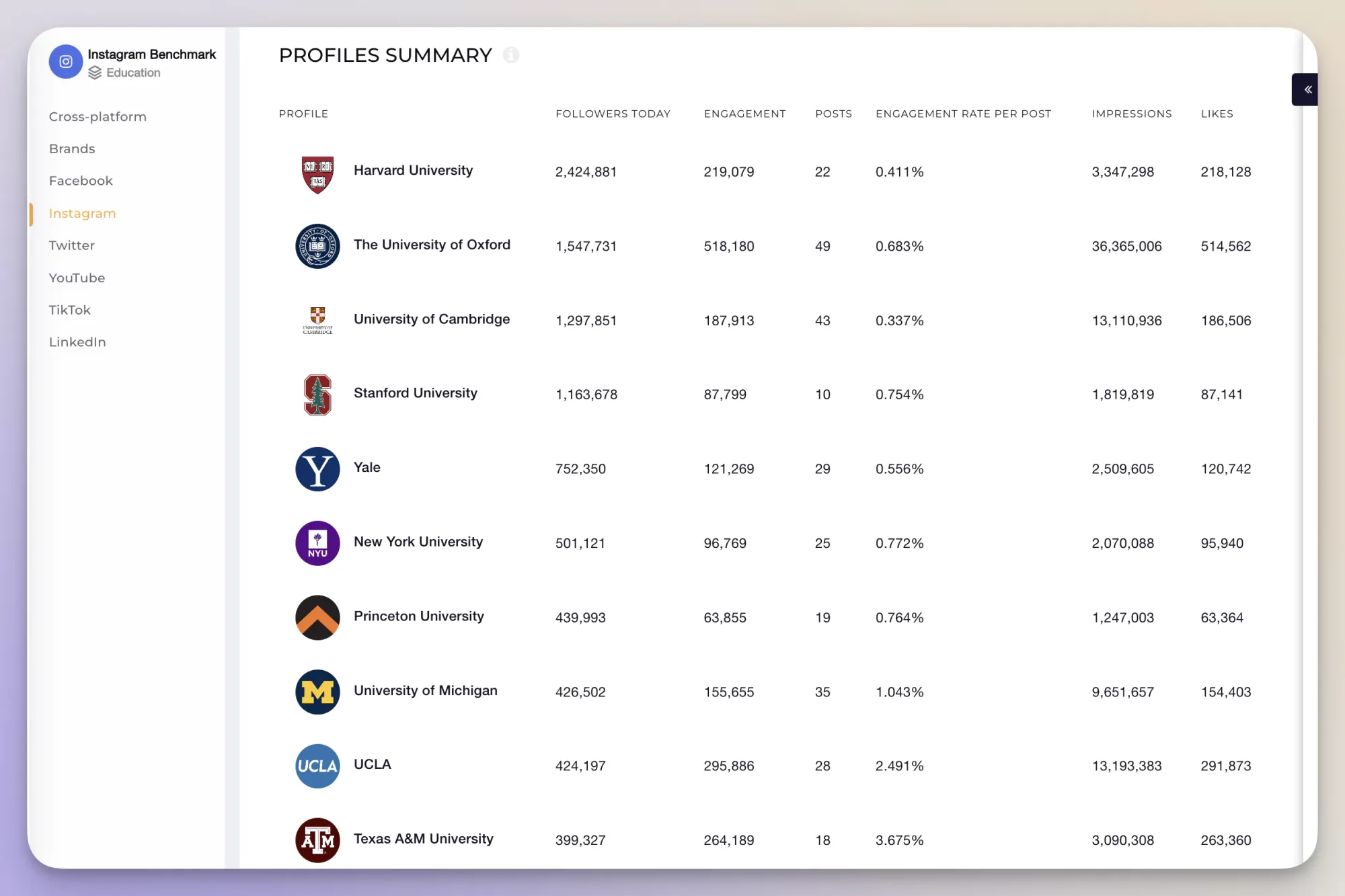
Get social media benchmarks for education
Analyze competitors in the education sector with Socialinsider.
Final thoughts
Whether we want it or not, educational social media seems to be the future. Of course social media use in education should be moderate, but never completely disregarded.
Social media and education might have a complicated relationship, but with the right tips, strategy and mindset, this duo can be a real game-changer for everyone involved.
FAQs about social media in education
What are the main social media challenges for the education segment?
The main challenges for social media in the education sector are misinformation, a high risk of distraction and addiction and privacy concerns.
How is social media good for education?
Social media helps students and educators stay connected, enables a high degree of accessibility for school materials and encourages students to be more actively involved in their academic growth.
How is social media used for education?
Social media can be used for education in a number of ways, including but not limited to: discovery, engagement, social proof and news distribution.






